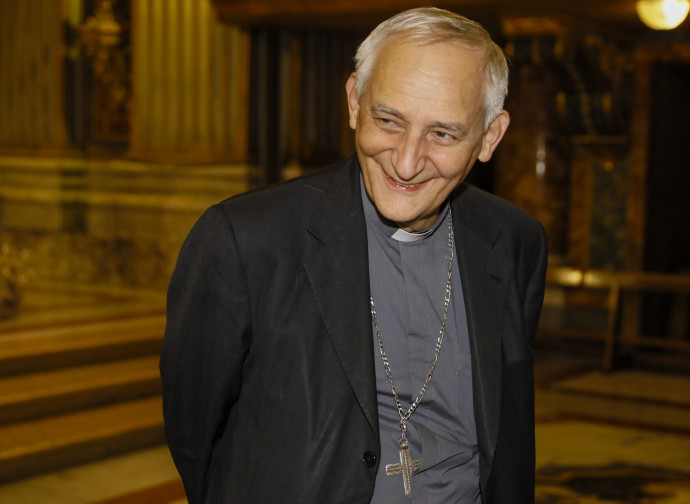For Cardinal Zuppi the end of Christianity is not a fact, but a dogma
It's not just over; the old Christian society is also a useless burden, according to the president of the Italian Bishops’ Conference (CEI). He announces the new 'good news' at the general assembly: secularisation will set you free. Thus a principle is elevated to a dogma, according to which the Church should allow the world to enlighten it on matters of faith.

For Cardinal Zuppi, secularisation is a kairos: the time willed by God; the opportunity designated by providence; the divine will that becomes present in history. In his opening address to the Assembly of Italian Bishops in Assisi on 17 November, he argued that with secularisation, 'what is coming to an end is an order of power and culture, not the living force of the Gospel. Today's believer is no longer the guardian of a Christian world, but a pilgrim of hope continuing to find its way into hearts. The end of Christianity is not a defeat, but a kairos — an opportunity to return to the essentials, to the freedom of the beginning, to the "yes" said for love, without fear or guarantees'.
We have reported some significant passages here from a thesis that should be clearly rejected. Let's be clear: this is nothing new. Not long ago, the Bishop Emeritus of Malines-Brussels, Josef de Kesel, supported it in much the same way as Zuppi (see the magazine Teologia, 1/2025). Many theologians have supported this view since the 1960s and even earlier. However, it is still bothersome to hear it repeated by the president of the Italian bishops.
Those who believe that the end of Christianity is imminent also believe that Christianity has been a mistake that has lasted for centuries. However, it is not Zuppi who invented this assessment; it is actually present in Maritain's Integral Humanism, which dates back about ninety years. Maritain wanted to replace Christianity with a 'new Christianity', but those who witnessed the demise of the latter came to greatly regret the former. Zuppi believes that Christianity was not a kairos, and that the Gospel was obscured by 'Christian civilisation'.
Consequently, he welcomes the destruction of this spiritual wealth and thanks God for it. He equates the great Christian epic — the reader should pause to consider what those centuries of Christianity meant — with power, fear, imposed faith, war against enemies, defending something to be protected, and a lack of hospitality and courage. (‘How presumptuous!’, one might say).
It is frustrating that Zuppi claims that, thanks to secularisation, we can finally proclaim the Gospel in a luminous way, implying that the saints and Christians of the past did so dimly. He suggests that we can only now "experience the motherhood of the Church and live by listening to the word that becomes life", implying that our spiritual ancestors did not do so. The societas christiana was not a mistake; what is wrong is the astonishing superficiality of this condemnation, by people who claim to no longer condemn, thanks to secularisation.
Apart from this enormous blunder in condemning Christianitas, the serious problem is Zuppi's application of a dogma that is now widespread in this dogma-free Church. Secularised society is a fact. Who would deny that today's society is secular? However, if considered only as such, facts are meaningless; they express no axiology, and are neither a value nor a disvalue. Zuppi, however, considers it a value, transforming a fact into a principle of meaning. This is a principle from which to start in order to shed light on the Christian faith. Today's secularisation is a dogma that judges Christianity, the Church and revelation, as well as the Christian centuries from Theodosius onwards, as a burden.
This mindset is now widespread among theologians, who start from the perspective of modern, secular, technological and scientific society and reconsider Catholic doctrine in relation to it. However, the current secularised situation did not arise spontaneously, but was produced by erroneous philosophies and theologies beginning with the Reformation. It was produced by a long process conducted against the Church. Anti-Christian forces produced this secularisation, and now the Church is starting from this situation — considered a 'kairos' — and reviewing its mission in light of it.
Zuppi does precisely this, motivated by a historicist mentality which holds that the current situation is always more just and convenient than the previous one and must be embraced. Today's kairos is superior to yesterday's; yesterday's was not superior. We do not allow the kairos to question us; we question it and make it say what we want. The kairos indicates qualitative time, but in this way it becomes quantitative, i.e. sociological.
This unfortunate intervention by Cardinal Zuppi coincides with the centenary of Pius XI's 'Quas primas' encyclical on the social kingship of Christ. More precisely, it was published on 11 December 1925, with its anniversary due in about twenty days. According to Zuppi, Quas primas did not express any 'kairos'; it was a mistake because it sought to create a Christian society. It imprisoned faith within the polluting demands of political power and sought consensus. Zuppi believes that Quas primas thought the Gospel needed political protection rather than people who embodied it. Fortunately, secularisation and Cardinal Zuppi came afterwards.
